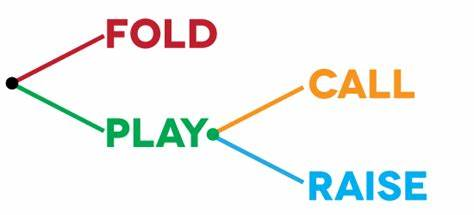Pre-Flop Play
Home » Pre-Flop Play
Poker Strategy and Pre-Flop Play, as with everything else, is determined by position. As you will recall, on our Position Page we placed a guide as to what Texas Hold’em hands to play pre-flop, and from what position. As I stated then, this is not an absolute, there are determining factors. Remember, in poker, everything is situational.
I’m not saying don’t play either hand nor am I saying to play it. I am saying think about who raised, who called, and who re-raised. Is that normal? Have they been raising a lot, or have they been fairly quiet? Are they good players? Tight, loose?
Let’s say you are on the Button, and the UTG+1 player raises 3X the BB. The Hi Jack re-raises 3X the UTG+1 players bet and the Cut Off calls. Think real hard about playing that pair of twos, or even sevens. What about the K,2s? Or ever K, J?
Something else to think about in Texas Hold’em Pre-Flop Play. Let’s look at the KJ. What can you beat? Can’t beat A,K, hand,A,Q, or A anything. K,Q. no, or any pocket pair. And if one raiser or caller has AK, AQ, or AJ, you can’t beat either of them. Hoping for that straight, well you have a 5% (19 to 1 odds) of that happening, pre-flop to the river. Two pair, two percent chance of that on the flop.

You Hit The Flop
Another consideration, regarding Texas Hold’em Pre-Flop Play, is let’s say you flop good, a King is on the flop and the original better bets 70% of the pot and the High Jack calls. Before you call, you need to think about what will the next bet be. The original raiser may check. If he does, then the re-raiser isn’t going to, in most cases. Now, what are you going to do?
One other thing to think about in pre-flop play is that you have no money in the pot. There will be another hand dealt. Is this the battle you want to fight, a raise, a re-raise, and a call, all before it gets to you? Again, I will never say that there is a firm rule to do this or that. I will say poker is situational, consider all the factors and think to the third level before you take action. You should be able to verbalize why you took the action you did, clearly and concisely, if only to yourself.
Pre Flop Mistakes
It has been repeated about a million times. I have read it in many books, seen it on training videos, and heard numerous players repeat it. “Never open limp pre-flop”. It’s like a rule. I don’t have any rules regarding poker. Certainly, in a lot of cases, a raise is the best choice, versus limping, but not always.
- You can’t win the pot by open limping.
- Open limping makes it easy for your opponents
- Open limping leads to a limp fest.
These are true. By open limping, you just added another BB to the pot, so the next player has even better pot odds, and so on around the table Not only this, but it will also encourage the Cut Off or Button to raise, just to take down the dead money in the pot. Bad business.
That said, “never” limping is as ridiculous as never raising. Limping is “good” for those hands that are too strong to fold, but too weak to raise. There are also those hands, small pocket pairs that come to mind, that play well in multi-way pots. If you flop big, a set, with those types of hands, you stand to win a large pot.


No Rules – Just Tools
At Pokerrailbird.com, you won’t find a mere repetition of poker rules, in fact, you will not find any rules at all. Instead, you’ll discover practical strategies, psychological insights, and mathematical analyses that can transform your approach to the game. I believe that by sharing my extensive knowledge and experience, I can help you become a more skilled and versatile player.
Thank you for joining me on this journey. Together, we can explore the depths of poker strategy, uncovering the secrets beneath this fascinating game’s surface. Let’s master the art of poker, one hand at a time.
Not Having A Plan For The Hand
Before you ever sit down at the table, you should have a plan for how you will play, what hands, and from what positions.
- What hands will you limp with, and from what position?
- What hands will you raise with, and from what position?
- What is your range for calling a pre-flop raise from a player in front of you?
- What is your range for re-raising a pre-flop raise? From what position?
- If your raise gets re-raised, how will you respond?
There are no rules, everything is situational. Although it’s impossible to have a concrete answer to all of these questions, you should have a good working knowledge of how you will respond to each. Again, regardless of your action, you should be able to verbalize “why” you decided as you did.


Texas Hold’em Pre-Flop Play – Mixing It Up
So you decide to raise, from UTG+! with 10s,7s. I am standing right behind you, and ask you why you raised. You tell me you want to “mix it up” because it was on page 93 of the book you just read. First, that’s not a good reason to raise.
In my world, there are three reasons to raise, and only three.
- To thin the field.
- To gather information
- To take the lead on the next betting round. (We take the lead because most players will say “check to the raiser” on the next betting round.
You don’t see to “mix” it up anywhere there, do you? Mixing it up by playing recklessly and against the math isn’t making winning decisions. This entire game is about making good decisions, with limited information. Let the other players “mix it up”, we will play by the math of the game, and the math says, in early position, a narrow range.
We have by no means covered all the aspects of Pre-Flop Play. We will continually update this site with more segments on all subjects. Check back with us often, lots more poker strategies to come.
Don’t forget to fill out the Contact Us form. You will then receive our Bi-Weekly Newsletter, as well as be informed of new articles placed on our site.
Not Being Aware Of Position
As we discussed on our position page, you must play a narrower range from the early position. The more players left to act behind you, the tighter your range needs to be. If you open with a hand like 10,7s, you cannot defend your raise, if you are re-raised by a player in late position. That is to say, your hand just can’t withstand the math in that case.

1 thought on “Pre-Flop Play”
Of course, what a magnificent website and instructive posts, I definitely will bookmark your blog.All the Best!